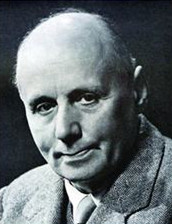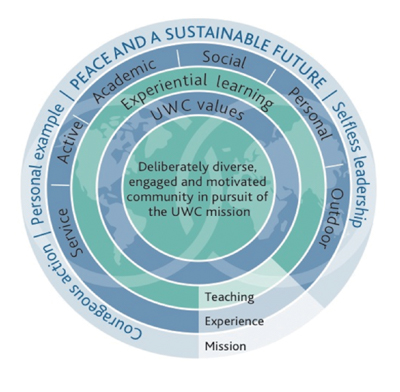UWC Mission UWC makes education a force to unite people,nations and cultures for peace and a sustainable future. UWC Values International and intercultural understanding | Celebration of difference | Personal responsibility and integrity | Mutual responsibility and respect | Compassion and service | Respect for the environment | A sense of idealism | Personal challenge | Action and personal example |
|
1. UWC Community
Deliberately diverse, engaged and motivated community in pursuit of the UWC mission
Guiding Principles:
This education should take place within a diverse community. The selection of students should ensure representation from regions and social groups that reflect the wide range of tensions among and between people.
Explanation:
The core of the UWC experience lies within a diverse community of learners who share a common commitment to the mission and values of the UWC movement. Diversity is supported by National Committees in over 155 countries which interview and select students who have made the most of the opportunities they have had and who exhibit qualities that fit with the UWC mission and values. Students are then chosen to join school communities to ensure cultural, racial, gender, socioeconomic, and language diversity in pursuit of a common mission. In this way, each campus reflects a global diversity that enhances connection, sharing, debate, and community living; and, thus encourages opportunities for growth, empathy, and understanding. Faculty and staff actively engage in community life as teachers, tutors, mentors and learners.
2. UWC Values
International and intercultural understanding | Celebration of difference | Personal responsibility and integrity | Mutual responsibility and respect | Compassion and service | Respect for the environment A sense of idealism | Personal challenge | Action and personal example
Guiding Principles:
All schools and colleges share the same basic values as outlined in the UWC mission statement – international and intercultural understanding; celebration of difference; personal responsibility and integrity; mutual responsibility and respect; compassion and service; respect for the environment; a sense of idealism; personal challenge; action and personal example.
This education requires active promotion of intercultural understanding and the development of genuine concern for others founded on shared life experiences, and cooperative and collaborative living. This includes reflective dialogue on global issues and critical and courageous engagement in the pursuit of peace.
Community interaction is placed at the heart of college life. This requires the full and active participation of all members of the school or college.
Opportunities for students to practice personal initiative, self discipline and responsibility, to manage risk and embrace challenge must be provided. Where appropriate, these opportunities are supported by a reassuring adult presence.
Explanation:
This part of the model, together with the outcomes, speak to the values infused in a UWC education throughout the movement.
3. Teaching
Experiential Learning
Guiding Principles:
Requires active promotion of intercultural understanding and the development of genuine concern for others founded on shared life experiences, and cooperative and collaborative living. This includes reflective dialogue on global issues and critical and courageous engagement in the pursuit of peace.
Community interaction is placed at the heart of college life. This requires the full and active participation of all members of the school or college.
Students are able to engage in continuing, positive action towards issues of sustainability, on both an institutional and individual level.
Opportunities for students to practice personal initiative, self-discipline and responsibility, to manage risk and embrace challenge must be provided. Where appropriate, these opportunities are supported by a reassuring adult presence.
Explanation:
Experiential learning is fundamental to UWC. Experiential learning is the process of making meaning from direct experience. Young people are thrust into a dynamic and diverse community. This situation provides a plethora of Challenging experiences to inspire a range of emotions and learning opportunities. These experiences can be challenging, joyful, frustrating, and life-changing. UWC provides a safe and supportive environment from which to learn through direct experience. By living and working together, students develop empathy and make sense of their experiences through such means as reflection, dialogue, trial-and-error, and perspective taking.
Along with living in a diverse community, students have opportunities to initiate and collaborate on areas of passion, interact with the larger community, and take advantage of service, creative, and physical opportunities. All of these programmes provide rich experiences for making meaning and learning.
Experiential Education is a more formal pedagogy that employs a philosophical stance and a variety of methodologies. Teachers and staff intentionally provide opportunities for students to engage in activities, exercises, and events to mindfully make meaning and apply emerging skills and understanding.
4. Experience
Active – Academic – Social – Personal – Outdoor – Service
Guiding Principles:
Recognition is given to the fact that each individual possesses unique talents and abilities. Programmes should exist in each college which enable all selected students to fulfill their potential.
Physical fitness and a healthy lifestyle are integral to the balanced development of the whole person. Unhealthy lifestyles limit human potential and hinder progress in all dimensions of development.
Explanation:
Within the context of the experiential process are the actual experiences shared within the UWC community. These are both formal and informal activities, programs, and situations that challenge students on a variety of levels. Formal experiences balance high expectations within the context of a rigorous academic programme, along with a rich and varied co-curricular program in which students engage in creative, physical, and service learning both offered by others and initiated by students.
Students are also informally challenged through interactions in an intercultural and diverse environment in their residence life and social activities. These challenges encourage sharing, dialogue, conflict transformation, and reflection to encourage seeing the world from a variety of perspectives
5. Mission and Outcomes
Peace and a Sustainable Future | Courageous Action | Personal Example | Selfless Leadership
Guiding Principles:
Underpinning these principles is the pursuit of peace and justice as the founding aim of UWC.
UWC schools and colleges offer life-defining experiences for young people, enabling them to discover the possibility of change through courageous action, personal example and selfless leadership. This education enshrines a commitment to the balanced development of the whole person; that is, its task is to encourage an integrated development of human potential across a range of different dimensions, including the intellectual, moral, aesthetic, emotional, social, spiritual, and physical.”
Students are able to engage in continuing, positive action towards issues of sustainability, on both an institutional and individual level.
Explanation:
By bringing together a diverse and motivated student body, immersing them in a global community experience based on the UWC values, and challenging them formally and informally, students grow in their abilities to be active global citizens.
The holistic UWC experience leads to learning skills, competencies, and outcomes toward the UWC mission to make "education a force to unite people, nations and cultures for peace and a sustainable future."











